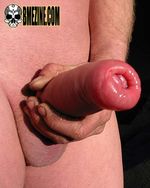Vacuum pumping
Jump to navigation
Jump to search
Usually using an acrylic cylinder and a hand pump (or a myriad of other contraptions which all have the end effect), a body part — usually the penis (but the scrotum, labia, clitoris, male or female breasts, etc. may all be pumped as well) — is inserted. The air (or sometimes water) is drawn out using the pump, and the body part is drawn in. Because of the pressure differential the tissues expand and become swollen and engorged with blood and fluids. Done repeatedly, the results become at least semi-permanent.
Vacuum pumping is quite safe, but overzealous pumping can break small vessels and result in discoloration of the body part. Water blisters are also possible. The rule is "long sessions are better than short high pressure ones."





